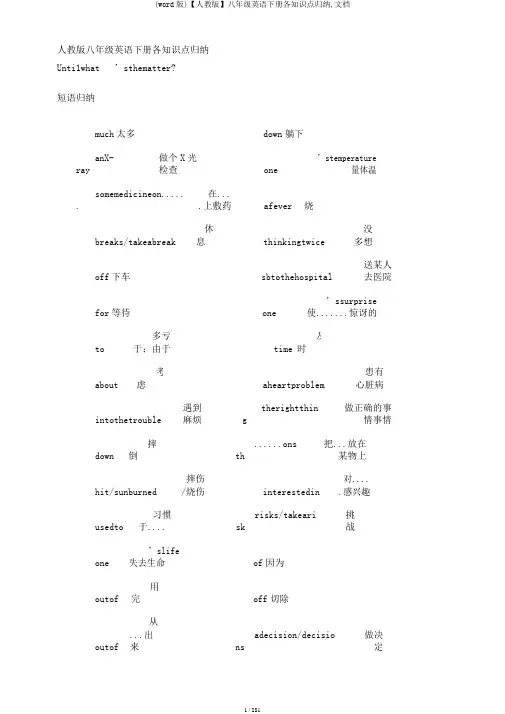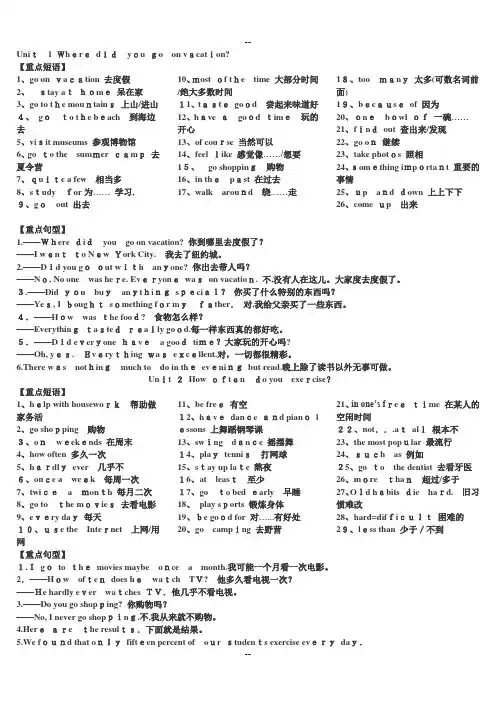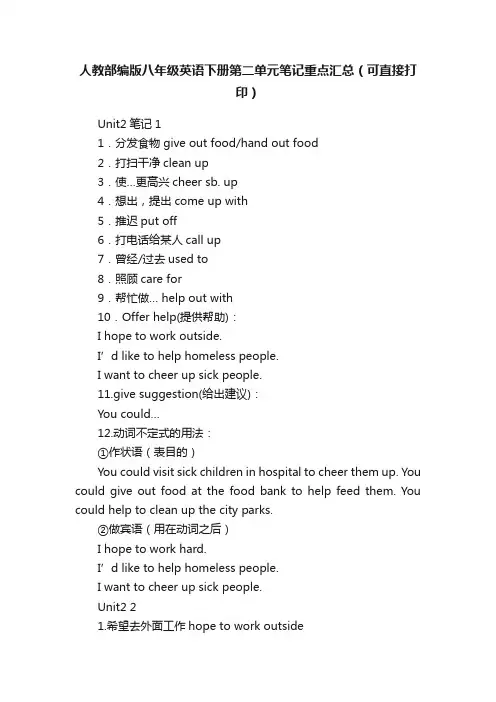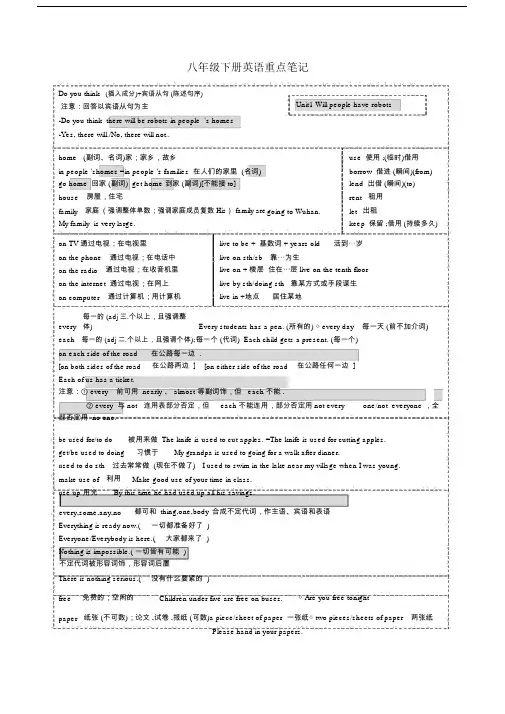人教版八年级英语重点笔记.doc
(word版)【人教版】八年级英语下册各知识点归纳,文档

人教版八年级英语下册各知识点归纳Unti1what ’sthematter?短语归纳much太多down躺下anX-ray 做个X光检查one’stemperature量体温somemedicineon..... .在....上敷药afever发烧breaks/takeabreak休息thinkingtwice没多想off下车sbtothehospital 送某人去医院for等待one’ssurprise 使.......惊讶的to多亏于;由于time及时about考虑aheartproblem患有心脏病intothetrouble 遇到麻烦therightthing做正确的事情事情down摔倒......onsth把...放在某物上hit/sunburned摔伤/烧伤interestedin对.....感兴趣usedto习惯于....risks/takearisk挑战one’slife失去生命of因为outof用完off切除outof从...出来adecision/decisions做决定incontrol of 掌管;管理up放弃用法归纳todosth.需要去做某事sbdoingsth 看见某人正在做某事sbsth询问某人某事sbtodosth期望某人做某事todosth同意做某事sb(to)dosth帮助某人做某事todosth 想要做某事sbtodosth 告诉某人做某事problems(in)doingsth做某事有困难sthtodosth用某物去做某事usedtodoingsth习惯于做某事todosth好似做某事ondoingsth继续做某事doingsth介意做某事语法点1.询问某人的健康问题及遇到麻烦的表达方法2.情态动词should的用法3.不定代词的用法精细解读1.What’sthematter(withyou)?怎么了?出什么事了?What’sthetrouble/theproblem/wrongwithsb./sth.?2.Ihadacold. 我感冒了。
复习人教版八年级英语上册各单元必背知识点整理(打印版)

Unit 1 Wheredidyou go on vacation? 【重点短语】1、go on vacation 去度假2、stay athome呆在家3、go to the mountains上山/进山4、goto the beach到海边去5、visit museums 参观博物馆6、go to the summer camp去夏令营7、quite a few相当多8、studyfor为…… 学习,9、goout 出去10、most of the time 大部分时间/绝大多数时间11、tastegood尝起来味道好12、have agood time玩的开心13、of course 当然可以14、feel like 感觉像……/想要15、go shopping购物16、in thepast 在过去17、walk around绕……走18、toomany太多(可数名词前面)19、becauseof 因为20、onebowl of一碗……21、findout 查出来/发现22、go on继续23、take photos 照相24、something important 重要的事情25、up and down 上上下下26、come up出来【重点句型】1.——Where didyou go on vacation? 你到哪里去度假了?——I wentto New York City.我去了纽约城。
2.——Did you goout with anyone? 你出去带人吗?——No, No one was here. Everyonewason vacation. 不,没有人在这儿。
大家度去度假了。
3.——Did you buyanythingspecial?你买了什么特别的东西吗?——Yes, I boughtsomething for myfather.对,我给父亲买了一些东西。
4.——How was the food?食物怎么样?——Everythingtastedreally good.每一样东西真的都好吃。
八年级下册人教版英语笔记

八年级下册人教版英语笔记一、Unit 1 What's the matter?1. 重点单词。
- matter:n. 问题;事情。
常用搭配:What's the matter (with sb.)? = What's wrong (with sb.)? = What's the trouble (with sb.)?(某人)怎么了?- sore:adj. 疼痛的;酸痛的。
例如:a sore throat喉咙痛。
- stomachache:n. 胃痛;腹痛。
- foot:n. 脚;足。
复数形式是feet。
- neck:n. 脖子;颈部。
- fever:n. 发烧。
have a fever发烧。
- lie:v. (lay - lain)躺;平躺。
lie down躺下。
- rest:v. & n. 放松;休息。
take breaks/take a break = have a rest休息。
- cough:v. & n. 咳嗽。
have a cough咳嗽。
- toothache:n. 牙痛。
2. 重点短语。
- have a cold:感冒。
- have a stomachache:胃痛。
- lie down and rest:躺下休息。
- drink some hot tea with honey:喝些加蜂蜜的热茶。
- see a dentist:看牙医。
- get an X - ray:拍X光片。
- take one's temperature:量体温。
3. 重点句型。
- What should I do? 我应该做什么?- You should see a dentist and get an X - ray. 你应该去看牙医并拍X光片。
- Should I put some medicine on it? 我应该在上面敷些药吗?- Yes, you should. / No, you shouldn't. 是的,你应该。
人教部编版八年级英语下册第二单元笔记重点汇总(可直接打印)

人教部编版八年级英语下册第二单元笔记重点汇总(可直接打印)Unit2笔记11.分发食物give out food/hand out food2.打扫干净clean up3.使…更高兴cheer sb. up4.想出,提出come up with5.推迟put off6.打电话给某人call up7.曾经/过去used to8.照顾care for9.帮忙做… help out with10.Offer help(提供帮助):I hope to work outside.I’d like to help homeless people.I want to cheer up sick people.11.give suggestion(给出建议):You could…12.动词不定式的用法:①作状语(表目的)You could visit sick children in hospital to cheer them up. You could give out food at the food bank to help feed them. You could help to clean up the city parks.②做宾语(用在动词之后)I hope to work hard.I’d like to help homeless people.I want to cheer up sick people.Unit2 21.希望去外面工作hope to work outside2.帮助摆脱饥饿help stop hunger(名词)3.食物赈济处food bank4.课后学习活动an after-school study program5.想出/提出一个计划come up with a plan6.推迟制定计划put off making a plan7.张贴标语put up signs8.写一些公告make some notices9.需要做某事need to do …10.在敬老院in an old people’s home11.让某人做某事ask sb. to do …12.帮助解决某事help out with sth.13.给我讲过去的故事tell me stories about past14.是孤独的/感觉孤独be lonely / feel lonely15.听/倾听listen to16.照顾他们care for themSection A 3a 笔记1.students who volunteer 做志愿服务的学生2.give up several hours to do sth.花费几个小时去做某事(动词不定式表目的)spend several hours doing sth. 花费几个小时做某事3.give up doing sth. 放弃做某事4.get such a strong feeling of satisfaction/joy 产生如此强烈的满足感/喜悦感get a feeling of happiness / joy / being helpful / satisfaction 产生幸福/快乐/助人/满足感5.the look of joy 快乐的表情6.on their owners’ faces 在他们主人们的脸上7.at the age of 4 在四岁的时候8.try out for…参加…的选拔9.go on a different journey 进行一次不一样的旅行10.a dream come true 梦想成真… is a dream come true for me.↓(名词/动名词)例:Volunteering here is a dream come true for me.Going on vacation in Yunnan is a dream come true for me.11.at the same time 同时Grammar Focus动词不定式的用法:(必须掌握三种基本用法)一、动词不定式作宾语:(用于动词之后)①want to do sth.②hope to do sth.③try/decide等等之后跟to do sth.二、作宾补(用于宾语之后)①would like sb. to do sth.②tell sb. to do sth.③ask / want / allow等等三、作状语1.We make some signs to put up around the school. (表目的)2.be+adj.(表示心情)+to do(作原因状语)I am sorry to trouble you. 补充其他用法:四、作主语:To be an engineer is my dream.五、作表语(用在be动词之后)His aim is to win the first prize.六、作定语:I’d like something to drink.(喝的东西)七、特殊疑问词+to do sthI don’t know how to plant a tree.Section B (1a-1e) 笔记1、take after=be similar to 与……像,相似(外貌、行为方面)look after 看起来像(多指外貌)2、修理:fix up fix it up (代词放中间)修理:repair修补:mend3、give away sth. to sb. 把某物赠送给某人give away 赠送,泄露give up 放弃give in (to) 屈服,投降give out 分发,用完耗尽4、broken bicycle parts 损坏的自行车部分My bike is broken. 我的自行车坏了。
人教版本初中八年级的的英语下册的笔记重点学习的记录版本.doc

dress + sb/oneself穿(动作) Will you dress the children
the answer(key) to the question问题答案
be dressed in +衣服(状态) The girl likes to dress in black .
We can’tgo out
because of the terrible weather.
注意:so(因此)为并列连词,不可与
because一起连用The weather is terrible, so we can’tgo out.
fall in love with =be in love with
He was lonely in a lonely island.住在荒凉的岛上,他感到很孤独。
even(甚至)如同much,so far, a little, a lot等词一样可饰形容词或副词比较级加强程度I can do it even better than him(he).
keep饲养;保持;保留probably > perhaps | maybe > possibly可能
many
more(较多的) + [可数复数]
much
more(较多的)+[不可数]
agree to sth同意(计划、办法、建议、条件) He agree to the plan.
agree to do sth同意做某事
I agree to meet him tomorrow.
agree with sb/意见/看法
on the phone
英语人教版八年级上知识点笔记完整版

英语人教版八年级上知识点笔记集团标准化办公室:[VV986T-J682P28-JP266L8-68PNN]U n i t1W h e r e d i d y o u g o o n v a c a t i o n?语法讲解:1.一般过去时考点1:如何判断一般过去时?考点2:肯定句变否定句。
考点3:变一般疑问和特殊疑问句。
2.复合不定代词/副词构成:__________ __________ __________ ____________________ __________ __________ __________其中:no one意思“_____”指_____,与_____同义,且_____与of连用,做主语谓语用单三。
回答 _______引起的特殊疑问句时要用 no one.none意思“_____”,指___________,且_____与of连用。
谓语单,复形式皆可。
回答___________ 引起的特殊疑问句时要用 none;anyone意思“_____”指_____,与_____同义,且_____与of连用。
any one意思“_____”指_____,与_____同义,且_____与of连用。
nothing= ________________用法:①复合不定代词做主语,谓语动词用_________.②当adj.修饰不定代词要________.③当不定代词中含有some通常用于__________;含有any通常用于_______________。
单词讲解:1.myself 反身代词是一种表示反射或强调的代词。
我自己myself你自己_________他自己_________她自己_________它自己_________我们自己_________你们自己_________他们自己_________反身代词在句中可用作动词宾语、介词宾语、表语和同位语等,如:quite a few/ little_______________only a few/ little 只有一些/一点儿3.seem v.好像;似乎;看来不及物动词“似乎/好像做某事”______________________连系动词:“看来……”+_________________seem like “____________”+名词(短语)。
人教版八年级英语上第一、二单元重点笔记
Unit 1 Where did you go on vacation?1.一般过去时:表示过去时间做某事或存在的状态.(1)当谓语动词是be时,其句式如下;a.肯定句:主语+was/were+其它Tom was at home yesterday.b. 否定句:在be 后加not:主语+ was/were+ not+其它.They were not in the USA last summer.c.一般疑问句: Was/Were+主语+其它?---Was Tom at home yesterday? ---Yes, he was./No, he wasn’t.---Were they in the USA last summer? --Yes, they were.. /No, they weren’t.d.特殊疑问句:特殊疑问词+was/were+主语+其它?Where was Tom yesterday? Where were they last summer?(2)当谓语动词是行为动词时,其句式如下:a.肯定句:主语+动词过去式+其它. Gina went to the beach yesterday.b.否定句:主语+ didn’t+动词原形+其它. Gina didn’t go to the beach yesterday.c.一般疑问句:Did+主语+动词原形+其它?---Did Gina go to the beach yesterday? --Yes, she did. /No, she didn’t.d. 特殊疑问句:特殊疑问词+did+主语+动词原形+其它?Where did Gina go yesterday?2. hill小山The house stands on a hill.Mountain大山He wants to see Himalaya mountains (喜马拉雅山).3.go with sb和某人一起去go to +某地+with sb和某人一起去某地Did you go with anyone? I want to go to the mountains with my family.4. some一些,一般用于肯定句和表示委婉语气疑问句中.Any一些,一般用于否定句,疑问句和条件句中.a.常见复合不定代词有:something一些东西, anything一些东西, everything每件东西, nothing没有东西, somebody=someone某人, anybody=anyone某人, everybody=everyone每人, somewhere某地, anywhere某地, everywhere每人地方, nowhere没有地方b.复合不定代词+定语(形容词,动词不定式等)something interesting一些有趣的东西, something to eat一些吃的东西5, few很少,几乎没有,表否定,后接可数名词复数.a few一些,表肯定,后接可数名词复数.quite a few相当多,表肯定,后接可数名词复数.little小的,后可以接可数名词;很少,几乎没有,表否定,后接不可数名词单数.a little有点儿=kind of. 一些,表肯定,后接不可数名词单数.quite a little相当多,表肯定,后接不可数名词单数.I have few good friends. Jim has a few storybooks. There is little water in the bowl.I feel a little tired after school. There is a little water in the bowl.6. most后直接+名词, most people大多数人most of +限定词+名词,作主语时,谓语动词单复数由它所修饰的名词单复数确定.most of后直接+宾格复数代词, most of us我们中大多数人Most of her money was stolen(被偷).Most of her books were stolen.7.反身代词Myself我自己, ourselves我们自己, yourself你自己, yourselves你们自己, himself他自己, herself她自己, itself它自己, themselves他(她,它)们自己8. nothing but除了---外,没有---,只是,仅仅.有时两词还可以分开.There was nothing much to do in the evening but read.晚上除了读书外,就没有许多要做的事.9.decide to do sth决定做某事decide not to do sth决定不做某事We decided to go to the beach near our hotel.10.try to do sth尽力做某事try doing sth尝试做某事Please try to finish this work in thirty minutes.My sister and I tried paragliding.11.feel like+名词/代词/V—ing/句子.觉得,想吃,想做,摸起来像I felt like I was a bird.12. walk与介词搭配的词组有:walk down/ along沿着---走, walk around/ round绕着---走, walk by /past走过,walk across/through步行穿过---, walk into走进---, walk on走---上walk=go for a walk=take/gave a walk散步13.因为because+句子because of+名词/代词/V—ing形式Because I am so tired, I want to have a rest. He isn’t at school because of the illness.14. below 与under区别:(1)两者都可以表示“在---正下方”,不表示正下方,则用below.(2) below表示”少于,低于”,主要用于表示温度,高度以及有纵向标准可比的情况.其它数量方面的“少于”多用under.The temperature is two degrees below zero.温度是零下2度.There were under forty people at the meeting.参加会议的人不足40人.(3)表示一物被另一物覆2,则常用underThe lost city is under the forest.消失的城市就在森林的下面.Unit 2 How often do you exercise?1.how often多久一次how long多长how soon多久以后how far多远2.once一次, twice两次, 三次或三次以上用“基数词+times”.如three times, four times, once aweek一周一次, twice a week一周两次, three times a month一个月三次,one to three times a week一周一到三次, three or four times a week一周三次或四次3.时间频度副词:放在be动词,情态动词,助动词之后;行为动词之前.always总是(100%)›usually通常(75%)›often经常(50%)›sometimes有时(20%)›seldom很少(10%)›hardly ever几乎不(2%)›never从不(0)It is sometimes hot here. I never play computer games.4.every day每天,在句中常作时间状语everyday形容词,日常的,只作定语修饰名词.I go to school by bike every day.It’s no easy to learn everyday English(日常英语).5.health不可数名词,健康healthy形容词,健康的be in good/bad health身体好/不好keep healthy=keep in good health保持健康6.be good for---有益be bad for---有害be good at擅长于be good to—-好be good with---有办法,---相处得好7.here引导的倒装句(1)当主语是名词时用完全倒装.Here+谓语动词+主语(名词).Here goes the bell.铃响了.Here is you letter.Here are my new friends.(2)当主语是代词时,用部分倒装.Here+主语代词+谓语动词.Here it is.它在这儿.Here you are.给你.8.not---at al一点也不,根本不I don’t like the film at all.9.用了“虽然”although,就不要“但是”but; 反之用了but, 就不要although. Although he is rich, he is not happy.10 for example只例举同类的人或事物中的一个例子,后要打逗号。
八年级英语重点笔记人教版
八年级英语重点笔记人教版Unit 1:Where did you go on vacation?重点单词:vacation, delicious, crowded,决定,尝试,拥挤的,美丽的,放松的重点句子:1、I went to the beach and saw some interesting animals.2、I feel more relaxed after a vacation.3、We visited some interesting places during the vacation.Unit 2:How often do you exercise?重点单词:how often, once a week, twice a day, hardly ever, result, online, question, effort 重点句子:4、How often do you watch TV?5、I usually exercise three times a week.6、Watching TV for too long can be harmful to your health.Unit 3:I'm more outgoing than my sister.重点单词:outgoing, quiet, carefully, carelessly, carefully, wildly, loudly, bravely重点句子:7、I'm more outgoing than my friend.8、She is more careful than me in her work.9、He sings more loudly than anyone else in his class.Unit 4:What's the best movie theater?重点单词:comfortable, cheap, crowded, bad, close to home, screen, sound, equipment 重点句子:10、What is the best movie theater in the city?11、The movie theater that has the biggest screen is the best.12、The movie theater that has the most comfortable seats is the best.Unit 5:Do you want to watch a game show?重点单词:boring, discussion, educational, plan, stand, expect, mind, hope重点句子:13、I don't mind watching a game show.14、I expect to watch a news program.15、I hope to see a talk show.Unit 6:I'm going to study computer science.重点单词:pilot, engineer, teacher, doctor, cook, lawyer, secretary, pilot重点句子:16、What do you want to be when you grow up?17、I'm going to be a doctor.18、I want to be a teacher because I like working with children.Unit 7:Will people have robots?重点单词:possible, impossible, human, future, environment, pollution, space, other 重点句子:19、It is possible that we will live to be 100 years old in the future.20、It is impossible for us to travel to the moon in the future.21、We need to protect the environment and reduce pollution.Unit 8:How do you make a banana milk shake?重点单词:ingredient,peel,pour,yogurt,honey,enjoy,cut,blender 重点句子:22、How many bananas do we need for the banana milk shake?23、First peel the bananas and cut them into pieces.24、Then pour the milk into the blender and add the bananas and yogurt.25、Finally add honey and blend the mixture until it is smooth.26、Enjoy your banana milk shake!。
八年级英语重点笔记人教版
八年级英语重点笔记人教版Unit 1 单元主题:School life1. Greetings and introductions- Hello!/ Hi!/ Good morning!/ Good afternoon!/ Good evening!- What's your name?/ What's your first/last name?- My name is.../ I'm...- Nice to meet you!/ Nice to meet you, too!2. Classroom objects and expressions- textbook, notebook, pen, pencil, ruler, eraser, sharpener- Open your book, please.- Close your book.- Read the text silently/aloud.3. School subjects and timetables- English, math, science, history, geography, PE (Physical Education), art, music- What's your favorite subject?- My favorite subject is...- My timetable: Monday - English, math, science; Tuesday - history, geography, PE; Wednesday - art, music, English.4. Personal pronouns and possessive adjectives- I, you, he, she, it, we, they- my, your, his, her, its, our, their5. Present simple tense- Affirmative: I/You/We/They + base verb; He/She/It + base verb + "s"- Negative: I/You/We/They + do not/ don't + base verb; He/She/It + does not/doesn't + base verb- Interrogative: Do/Does + I/you/we/they/he/she/it + base verb...?- Examples:- I play tennis every week.- She doesn't like coffee.- Does he go to school by bus?Unit 2 单元主题:Hobbies1. Leisure activities and sports- play sports/games (basketball, soccer, chess)- do activities/hobbies (draw, sing, dance, swim)- go + activity/place (go shopping, go hiking, go to the cinema)2. Expressing likes and dislikes- What do you like?/What are your hobbies?- I like... / I love... / I enjoy...- I don't like... / I hate...- I'm interested in... / I'm not interested in...3. Adverbs of frequency- always, usually, often, sometimes, rarely, never- I always go to the library on Sundays.- He rarely watches TV.4. Free time activities- read books/magazines/newspapers- listen to music/podcasts/radio- watch TV/movies/videos- play musical instruments (guitar, piano, violin)- hang out with friends- surf the internetUnit 3 单元主题:Family1. Family members and relationships- mother, father, parents, sister, brother, siblings, grandparents - aunt, uncle, cousin- son, daughter, children- husband, wife, spouse2. Physical descriptions- tall, short, slim, overweight, medium build- have + adjective (have long hair, have blue eyes)- be + adjective (be beautiful, be handsome)3. Talking about age- How old are you? / What's your age?- I'm twelve years old.4. Possessive pronouns and possessive 's- mine, yours, his, hers, ours, theirs- Peter's bag, Mary's sister5. Relationships and feelings- get along with (I get along with my sister.)- love, like, hate- happy, sad, angry, excited, tired, boredUnit 4 单元主题:My country1. Nationality and country names- China, Japan, the United States, Australia, France, England, Germany - Chinese, Japanese, American, Australian, French, English, German2. Capital cities and landmarks- Beijing, Tokyo, Washington D.C., Sydney, Paris, London, Berlin- the Great Wall, the Eiffel Tower, the Sydney Opera House3. Geography and climate- mountains, rivers, lakes, deserts, forests- hot, cold, humid, dry4. Cultural traditions and customs- Chinese New Year, Christmas, Thanksgiving, Easter- Dragon Boat Festival, Mid-Autumn Festival- traditional food, costumes, dances, music5. Famous people and historical events- Confucius, Einstein, Mozart, Shakespeare- World War II, the Renaissance, the French Revolution以上是八年级英语重点笔记人教版的内容,希望对你有所帮助。
人教版英语八年级上册 知识点笔记
人教版英语八年级上册知识点笔记
本文档是人教版英语八年级上册的知识点笔记,内容包括但不
限于以下几个部分:
Unit 1 重点知识
1. 表示时间的几种表达方法:on+具体日期、at+具体时间点、
in+时间段、every+时间段、once a week/month/year等。
2. 祈使句的用法及其五种基本句型:肯定祈使句、否定祈使句、let's句型、why not句型、would you mind句型。
3. 陈述句、疑问句、祈使句、感叹句四种句型的用法及转换。
Unit 2 重点知识
1. 过去完成时的构成及用法,表示过去已经完成的动作或状态。
2. 直接引语和间接引语的转换方法及其注意事项。
3. 一些常见的连词及其用法:although、as、because、since、when、while等。
Unit 3 重点知识
1. 现在完成时的构成及用法,表示过去发生的动作对现在造成的影响或结果。
2. 一些常见的副词及其用法:already、yet、just、never、ever 等。
3. 形容词的比较级和最高级的构成及其用法。
......
本文档只是对知识点进行简单概括,更详细的内容需要在课本和相关资料中学习和掌握。
同时,建议同学们进行课后练习和自我检测,加深对知识点的理解和记忆。
- 1、下载文档前请自行甄别文档内容的完整性,平台不提供额外的编辑、内容补充、找答案等附加服务。
- 2、"仅部分预览"的文档,不可在线预览部分如存在完整性等问题,可反馈申请退款(可完整预览的文档不适用该条件!)。
- 3、如文档侵犯您的权益,请联系客服反馈,我们会尽快为您处理(人工客服工作时间:9:00-18:30)。
人教 , 版 , 八年级 , 英语 , 重点 , 笔记 ,Wheat, ’,the,Wheat ’s the matter?’s the matter?本句是常见的口语表达,意为“怎么了?”常用于询问病情。
a stomachache是固定搭配,意为“胃痛”。
Have a sore+ 身体某部位是指身体某处疼痛。
have a sore throat意为“咽喉痛”,是固定短语。
down 是固定短语,意为“躺下”。
其中lie是动词,lie的现在分词是lying.lie还有如下词性和含义:( 1 )做动词,意为“位于;坐落在”。
过去式是lay; 过去分词是 lain .( 2 )做动词,意为“撒谎;说谎”。
Lie to sb. “对某人撒谎”。
过去式是lied; 过去分词是 lied.作名词,意为“休息” have a rest=take a rest=rest休息。
作动词,意为“(使)疼痛;受伤”,它的过去式和过去分词都是hurt.sb. doing sth.表示“看到某人正在做某事”,强调动作正在进行。
see sb. do sth. 表示“看到某人做某事”,强调动作经常发生,或看到某个动作发生的全过程。
off是固定短语,意为“下车”。
one’s surprise意为“令某人惊讶的是”;surprise是名词,意为“惊讶;惊奇”。
e作为名词,意为“问题,苦恼”,可以做可数名词,也可以做不可数名词。
have trouble doing sth.表示“在做某事方面有困难”。
away 和 right now是同义短语(可以替换使用),意为“立即;马上;立刻”。
is interested in mountain climbing是定语从句,其中who 是关系代词,在定语从句中做主语,也可以用that来代替。
used to后接名词、代词或动名词,意为“习惯于”be used to do sth被用来做某事;be used to doing sth习惯于做某事。
risks/a risk是固定搭配,意为“冒险”。
其中risk是名词,意为“危险;风险”。
risk还可以作动词,意为“冒险”。
out 是“动词 +副词”结构的不及物动词短语,意为“用完,用尽,”主语通常是时间,金钱、食物、等无生命的东西。
off是固定短语,意为“切除;切断;剪断”。
ance 是名词,意为“重要;重要性”。
on 是名词,意为“决定;抉择”。
make a decision相当于decide,表示“作也决定”。
in control of 是固定搭配,意为“掌管;控制”。
control既可以作名词,也可以作动词。
on doing sth.是固定搭配,意为“继续做某事;坚持做某事”。
up 是固定搭配,意为“放弃”。
give up doing sth.意为“放弃做某事”。
many 表示“太多”,中心词是many,用来修饰可数名词的复数形式too much 表示“太多”中心词是much,用来修饰不可数名词。
much too 表示“太”,中心词是too ,用来修饰形容词或副词。
e是连词,意为“因为;由于”引导原因状语从句。
because of是介词短语,意为“因为;由于”,后跟名词、代词或动名词。
作动词,意为“死;去世;逝世。
”dead 作形容词,意为“死的;死亡的”。
death 作名词,意为“死;死亡”。
l ’ll help to clean up the city parks1. hope to do sth. 意为“希望做某事”,动词不定式作hope 的宾语。
含hope to do sth. 的句子可以转换为含宾语从句的句子。
2.clean up 是固定搭配,意为“打扫干净;清除干净”。
它的宾语有两种情况:1)如果宾语是名词,该名词宾语可以位于clean 和 up 之间,也可以位于clean up之后。
2)如果宾语是代词,该代词宾语只能位于clean 和 up 之间。
cheer up 意为“使振作起来;使高兴起来”,其中cheer 是动词,意为“欢呼;喝彩”。
它的宾语有两种情况:1)如果宾语是名词,该名词宾语可以位于cheer 和 up 之间,也可以位于 clean up 之后。
2)如果宾语是代词,该代词宾语只能位于cheer 和 up 之间。
3. give out 意为“散发;分发”,相当于hand out ,是“动词 +副词”结构,若代词作宾语,代词必须放在give out 中间且用宾格;若名词作宾语,名词可以放在 give 和 out 之间,也可以放在后面。
give out 还有如下含义:发出,放出(热、光等);用完,耗尽;公布,宣布;4. put off 意为“推迟;延迟”,是常见的put 短语。
put on 穿上;戴上; put away 收起来;5. call up 是固定搭配,意为“打电话给(某人);征召”。
e up with 是固定搭配,意为“提出,想出(答案、计划等)”。
7.how things used to be是宾语从句,宾语从句要用陈述句语序。
ed to 表示“过去常常;以前经常”,后跟动词原形,用来描述过去经常发生的动作或存在的状态。
used to在变否定句或疑问句时常借助于助动词did 。
Be used to习惯于;后跟名词、代词或动名词。
used to do sth “过去常常做某事”, be used to doing sth “习惯于做某事”。
9.how to care for animals属于“特殊疑问词+动词不定式”的结构,该结构在句中作介词 about 的宾语。
该结构还可以转换为宾语从句how I can care for animals.当“特殊疑问词 +动词不定式”结构在句中做宾语时,通常可以转换为宾语从句。
10.care for是固定搭配,意为“照顾;喜欢”。
11. so和such的区别:so用来修饰形容词或副词。
much,few , little(少)修饰时,要用so,而不是suchsuch.用来修饰名词。
当名词前有many,12.strong 作形容词,意为“强烈的;强壮的”。
反义词:weak 虚弱的,弱的。
13.feeling作名词,意为“感觉;感触”,是由feel(感觉)加名词后缀-ing构成的。
feelings 表示“情感,感情”,通常用其复数形式。
14. satisfaction作名词,意为“满足;满意”。
15. take take out after 是常见的take 短语,意为“(外貌或行为)像”。
取出,掏出。
take back收回。
Take+ 介词 / 副词短语有:16. be similar to表示“和相似;和类似”,simlar作形容词,意为“相似的;类似的”。
17. 几种不同时态的被动语态:一般现在时am/are+done ;一般过去时was/were+done ;现在进行时 am/is/are being+done ;一般将来时will be+done ; am/is/are going to be+done;现在完成时 have/has been+done.( 记忆口决:被动语态必有be done ,时态都在 be 上转换)。
18. make it+adj.(+for sb)+to do sth. 意为“使(某人)做某事是的”,其中it 是形式宾语,真正的宾语是后面的动词不定式短语。
类似这种用法的动词还有think ,find 等。
19. make a difference 是固定搭配,意为“有影响;起作用”。
make a differenceto “对有影响,是固定搭配。
20. difficulty 作名词,意为“困难;难事”,既可以作可数名词,也可以作不可数名词。
常用词组是 have difficulty (in) doing sty. 意为“做某事有困难”,其中介词(in )可以省略。
21. be excited about是固定搭配,意为“因而兴奋不已”。
其中excited 作形容词,意为“激动的;兴奋的”。
excited 常用来修饰人;同根词exciting 常用来修饰事或物。
22.change 意为“变化;改变”,可以作动词,也可以作名词。
23.动词不定式的基本形式是“ to+ 动词原形”,否定结构是“ not to+ 动词原形”。
动词不定式在句中不能作谓语,其形式不随主语的人称、数和时态而变化。
24.动词不定式可以用在疑问句词 what ,how,when,where 等之后,作主语、宾语、表语等。
当“特殊疑问词 +动词不定式”结构作宾语时,通常可以和宾语从句进行同义转换。
25.动词不定式的常用搭配:有些动词只能跟动词不定式作宾语,此类动词有plan , hope,agree , decide 等。
26.有些动词后要跟动词不定式作宾语补足语,些类搭配有:want do sth.想要某人做某事;tell do sth.告诉某人做某事;encourage do sth.鼓励某人做某事;wan do sth.警告某人做某事;ask do sth.请求某人做某事;advise do sth建议某人做某事;27.用 could 表达建议,此时 could 可以翻译为“可以”, could 用于表达建议时语气较委婉,不是 can 的过去式。
could 还可以是 can 的过去式,可表示过去具备的能力。
28.repair 意为“修理”,修理的对象侧重于破损、毁坏或发生故障不能正常使用的物体。
mend意为“修理”,修理的对象是一些琐碎的物品。
如粘贴的小用具、玩具、要缝补的衣服等。
fix意为“修理”强调校准、校正。
和repair意义相近。
29. alone 可以作形容词,也可以作副词,强调独自一人,没有同伴。
作形容词时,在句中多用作表达或宾语补足语,不能作定语。
lonely只能作形容词,意为“孤独的;寂寞的”,带有一定的感情色彩。
